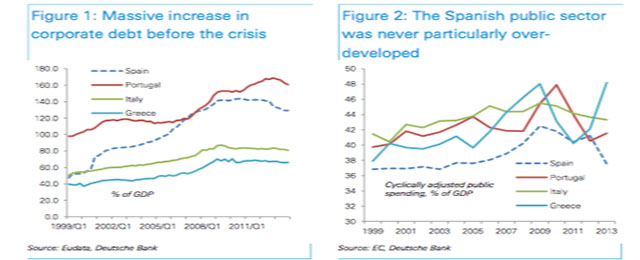After the storm, Spain is currently enjoying a period of relative calm. There is still much to be done, but “the turnaround of the Spanish economy has been impressive,” Deutsche Bank’s analysts state in a report called “Five lessons from the Spanish Phoenix”.
The overheating in Spain’s private sector in 2008, especially in construction, led the country to find a “manageable policy equilibrium by resisting an overly harsh fiscal adjustment, allowing a convincing adjustment of the private sector to take place without triggering a self-perpetuating recessionary spiral,” DB’s experts said.
Furthermore, the ESM contribution was vital for recapitalizing the Spanish banking system.
“Rajoy was probably right not to request a full-blown support package from the ESM which would have been a condition for OMT intervention,” DB analysts comment.
The report also praised the attitude of Spain’s trade unions when developing the labour market reform on the grounds that they were as much important as the structural reforms themselves. In fact, Deutsche Bank thinks that “fairly cooperative unions are a key asset for Spain in attracting Foreign Direct Investment through the incorporation of technical and organizational innovation.”
As for the overwhelming unemployment rate, the report underlines the importance of having a social network that contributes to manage these number of jobless people.
Finally, last European polls results have also been taken into consideration. Despite comments anticipating the end of the traditional bipartisan system in Spain, “the two traditionally dominant forces, centre-right Partido Popular and centre-left PSOE, topped the polls. In Deutsche Bank’s opinion, it would mean that PM Mariano Rajoy could be re-elected.
Spain gave Europe and the world certain lessons but it still needs to learn some others in order to solve its unremained problems: the reduction of its public deficit at 7.1% of GDP, the sustainability of the current level of long term interest rates; the sustained balance between competitiveness and deflation risks; the long term effect on productivity, and the unclear capacity to form an effective coalition in 2015.






Be the first to comment on "Spain’s lessons to give and learn"